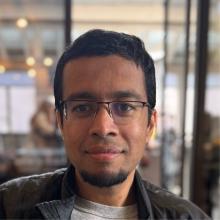Summary
Disclaimer: This summary has been generated by AI. It is experimental, and feedback is welcomed. Please reach out to info@qcon.ai with any comments or concerns.
The presentation focused on how LinkedIn leverages AI to enhance engineering efficiency and productivity.
Introduction
- LinkedIn aims to create economic opportunity and connect professionals for productivity and success.
- The platform supports 1.3 billion members, serving 17,000 connections and nearly 2 million feed updates per minute across 36 languages.
- The engineering scale at LinkedIn includes about 7,000 deployables and over a million PRs annually.
AI Implementation in Engineering
- Historically, engineering improvements at LinkedIn used conventional tools like CLI scripts, self-serve UIs, and extensive documentation.
- AI introduces a shift from manual cognition to systems that execute human intent reliably, focusing on writing the "right code."
- Agents are integrated to collaborate with humans and other agents to assist with development tasks.
Model Context Protocol (MCP)
- MCP allows for unified access across various models, standardizing context injection and enhancing agent interoperability.
- A hybrid model strategy combines internal open-source models for sensitive workloads with commercial models for broader tasks.
- Context engineering ensures that agents have structured, relevant data for AI reasoning, addressing challenges like authentication in secure environments.
Orchestration and Execution
- Agents require explicit structured specs to execute tasks reliably, which include clear definitions of scope, tools, and acceptance criteria.
- An orchestration layer creates a sandboxing environment for agents, handling task execution asynchronously while maintaining audit trails.
- Orchestration ensures consistent outcomes across different tasks, from code changes to library upgrades within repositories.
Context and Memory Management
- Agents improve through a feedback loop, utilizing working, long-term, and collective memories to inform their actions.
- Consistent context and tools are essential, as agents manage tasks across decentralized teams without repetitive implementations.
- The platform responsibility ensures effective AI enablement, avoiding costly individual team solutions.
This strategic integration of AI at LinkedIn enhances engineering processes, from intent specification and task orchestration to leveraging MCP for effective AI deployments.
This is the end of the AI-generated content.
Discover how LinkedIn is operationalizing AI tools at scale to drive measurable productivity gains across its engineering organization.
This session explores how LinkedIn is building AI agents that collaborate with each other and humans to assist with core software development tasks such as writing code and refactoring, and how we leverage standardized developer environments to make agent execution safe, observable, and scalable across teams. Central to this effort is the use of the Model Context Protocol (MCP) to unify access across diverse models and tools, enabling consistent context injection, reliable agent behavior, and seamless interoperability across internal and external systems.
The talk also covers LinkedIn’s hybrid model strategy—balancing internally hosted, fine-tuned open source models for sensitive workloads with externally hosted commercial foundation models for broader reasoning tasks—alongside robust model governance and lifecycle management practices.
The talk will discuss real-world challenges around context engineering techniques that structure enterprise data for meaningful AI reasoning, and strategies for addressing authentication and authorization when agents act on behalf of employees in secure environments.
Gain insights into the architectural and infrastructural foundations that turn generative AI from promise to productivity.
Interview:
What is your session about, and why is it important for senior software developers?
The session is about how LinkedIn is operationalizing AI Tools, specifically multi-agent systems interacting with MCP tools to assist with core software development tasks like writing and refactoring code. We’ll explore how standardized developer environments and safe, observable agent execution enable AI to be embedded into everyday engineering workflows at scale
For senior developers, this matters because AI is moving beyond an experimental assistant in the IDE, it is becoming part of the core developer and maintenance process. Understanding how to design and govern these systems will be a key skill to make technical decisions and drive productivity without compromising code quality, security, or developer trust.
What are the common challenges developers and architects face in this area?
- Context Fragmentation - AI agents need accurate, and up-to-date context to be effective, but enterprise data is often scattered across systems and not generally under a unified taxonomy
- Large Scale MCP Usage - Identified the right tools to be called at the right time continues to be a challenge for agents, especially at scale with a large number of servers and tools
- Inconsistent Execution Environments - Without standardized developer environments, AI actions can produce inconsistent results or break workflows
- Security and Trust - Letting AI act on behalf of engineers requires airtight authentication, authorization, and auditability. It’s challenging to balance innovation speed with the guardrails needed for safe, compliant AI use at scale.
- Build vs Buy - Choosing between building custom AI capabilities in-house or adopting third-party tools involves balancing speed, governance, security, and integration complexity
- Cost vs Productivity - AI tools can be expensive, especially at scale. Leaders must be able to measure actual productivity gains to ensure high ROI.
What's one thing you hope attendees will implement immediately after your talk?
We hope we’ll see more people implement robust context engineering practices to improve the productivity of AI assisted tools and design AI workflows around standardized, observable execution environments.
What makes QCon stand out as a conference for senior software professionals?
Real insights from senior practitioners, grounded in real world experience and practical examples for others to emulate.
What does being part of the QCon mean to you?
Being part of a community of real world practitioners, and being able to exchange ideas/learn from each other.
What was one interesting thing that you learned from a previous QCon?
The "Mastering Long-Running Processes in Modern Architectures" talk at QCon 2024 taught me a lot about handling asynchronous long-running workflows, gracefully degrading and appropriately surfacing errors to users. A lot of the lessons learned here have been incorporated into our agentic workflows.
Speaker

Karthik Ramgopal
Distinguished Engineer & Tech Lead of the Product Engineering Team @LinkedIn, 15+ Years of Experience in Full-Stack Software Development
Distinguished Engineer and the Uber technical lead for the Product Engineering team at LinkedIn, leading ~5000 engineers responsible for developing and operating all of LinkedIn’s member and customer-facing products. 15+ years of experience in full-stack software development, design, and architecture, across product and infrastructure engineering teams. Role entails strategically shaping LinkedIn's technical vision across a wide range of domains with hands-on contributions to code and design on specific projects, with a primary focus on Generative AI applications (products and internal productivity use cases) in the recent past.
Find Karthik Ramgopal at:
Speaker

Prince Valluri
Principal Engineer & Tech Lead for Boosting Developer Productivity with AI @LinkedIn
Principal Engineer, specializing in Developer Productivity for 10+ years. Tech Lead for boosting productivity for 10,000+ LinkedIn engineers with AI. Focussed on building and scaling internal platforms for all engineers to move faster and more efficiently.

